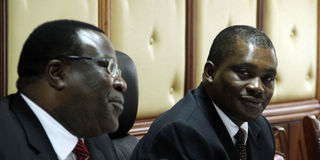Muturi warns of financial crisis if election date is not changed

Speakers of the Senate and National Assembly, Ekwee Ethuro (left) and Justin Muturi (right). Speaker Muturi wants all referendum drives incorporated into one single Bill. FILE PHOTO | DIANA NGILA | NATION MEDIA GROUP
What you need to know:
Constitution does not provide for the dissolution of Parliament but with the Elections Act requiring nominations to take place at least 60 days to the election day, Parliament will be without its members.
Sixty days to the polls would be early June, around the same time the Budget Statement is read in Parliament by the Treasury Cabinet Secretary and just weeks to the end of the financial year, June 30.
The Division of Revenue and the County Allocation of Revenue Bills are, however, necessary for counties to receive their annual allocations.
MPs might not be around to scrutinise and approve the Budget and laws on financing of counties next year if the General Election date remains August 8, 2017, National Assembly Speaker Justin Muturi has said.
Mr Muturi said this could result in the Budget for the 2017/2018 financial year being done by the Executive and failing to undergo checks by Parliament, which will have to be adjourned 60 days to the General Election.
“It will also be difficult in an election year to get requisite quorum to pass very serious agenda in Parliament during the last quarter of the election year since members will be busy on the ground battling for re-election,” said Mr Muturi in a statement.
LOOMING CRISIS
The Speaker, who also heads the Parliamentary Service Commission, urged stakeholders to “think through these dangerous possibilities” and make decisions that are good for the country.
The Constitution does not provide for the dissolution of Parliament but with the Elections Act requiring nominations to take place at least 60 days to the election day, Parliament will be without its members.
Sixty days to the polls would be early June, around the same time the Budget Statement is read in Parliament by the Treasury Cabinet Secretary and just weeks to the end of the financial year, June 30.
The Constitution, however, provides for the National Assembly to authorise the withdrawal of money from the Consolidated Fund if the Appropriations Act is not approved by the end of June. Only half of what is in the Budget can be used that way.
The Division of Revenue and the County Allocation of Revenue Bills are, however, necessary for counties to receive their annual allocations.
Last December, the Independent Electoral and Boundaries Commission announced that the next elections would be held on Tuesday August 8, 2017.
The Constitution stipulates that polls must be held on the first Tuesday of August during the fifth year of the government in office.
Mr Muturi’s suggestion means that MPs could have to rush through an amendment to the Constitution to change the date of the election if the country is to avoid a financial crisis.
An attempt to do so through a Bill sponsored by Ugenya MP David Ochieng and backed by the Justice and Legal Affairs Committee last year fell through after it failed to get the support of 233 MPs in the National Assembly.
The Speaker has spoken about the matter in the past, and in an interview at the end of 2015, he encouraged interested parties to seek the guidance of the courts, the final arbiters in the interpretation of the Constitution.
“I think people should have gone to seek the interpretation of the High Court using Article 165, just like was the case in 2012,” said Mr Muturi.





